In order to maintain a competitive edge, you need be prepared for artificial intelligence (AI), which is guiding the future. A branch of artificial intelligence known as machine learning (ML) enables software programs to recognize patterns and make precise predictions. We now have self-driving vehicles, spam-filtering email, traffic monitoring, and more thanks to ML. You must provide their system with precise labeled data in order to develop the best possible machine learning models. This Process is called Data Labeling.
Also Read 15 Best Data Management Software & Top Tools 2022
What Is Data Labeling?
Data labeling is the process of locating items in unprocessed data, such as videos and photographs, and assigning them labels that will assist your machine learning model provide precise estimates and predictions. Data annotating, for instance, enables digital assistants to identify voices, driverless cars to halt at pedestrian crossings, and security cameras to spot questionable activity.
How Does Data Labeling Work?
Data Collection
Begin by gathering a sizable amount of material, such as pictures, movies, audio files, texts, etc. In comparison to a little amount of data, a vast and varied amount ensures more reliable findings.
Data Tagging
Data tagging is the process of employing a data labeling platform and human labelers to find items in unlabeled data. They can be asked to spot a person in a picture or locate a ball in a moving image.
Quality Assurance
To build top-performing ML models, your labeled data must be reliable and informative. If you don’t have a quality assurance (QA) mechanism in place to verify the accuracy of your labeled data, your machine learning (ML) model won’t work as intended.
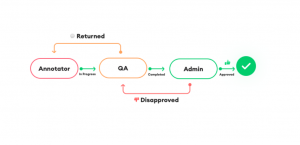
Model Training
Feed labeled data with the right response to the ML algorithm to train the model. You may generate precise predictions using your newly trained model on a fresh batch of data.
What Are Some Of The Best Practices For Data Labeling
Use these tried-and-true data labeling techniques to manage a project successfully.
Collect Diverse Data
To reduce prejudice, you want your data to be as varied as possible. Let’s say you want to teach a self-driving automobile model. The automobile will have problems driving in the mountains if the data you use to train your model was gathered in a metropolis. For this reason, be sure to capture photos and movies from all perspectives and lighting situations.
Collect Specific Data
To prevent the model from becoming confused, your data must be precise. Although it seems to go against the previous principle, it is crucial to provide the model with the data it requires in order to function properly. Therefore, if you’re developing a model for a robot waiter, use restaurant data. Using data gathered in a mall, airport, or hospital to feed the model will result in misunderstanding.
Establish QA Process
To evaluate the labels’ quality and ensure project success, incorporate a QA process into your project pipeline. There are several methods for doing that:
Audit Tasks:
Add “audit” jobs among the usual ones to evaluate the labeler’s level of effort. To prevent prejudice, “audit” jobs shouldn’t be different from other work items.
Targeted QA:
Work items with differences amongst annotators should be given priority for review.
Random QA:
Check a sample of each annotator’s work on a regular basis to assess the caliber of their contributions.
Utilize these techniques and the results to enhance your policies or instruct your annotators.
Setup An Annotation Guideline
To prevent potential errors from the start, provide an informative, clear, and succinct annotation guideline that outlines annotation and tool instructions. Consider using examples to illustrate the labels; images aid in better comprehension of the annotation requirements by QAs and annotators than written explanations. The final aim should also be mentioned in the policy so that the workforce can see the broad picture and be inspired.
Find The Most Suitable Annotation Pipeline
Enhance the productivity and cut down on delivery time, put in place an annotation pipeline that suits the requirements of your project. Prevent annotators from wasting time looking for a label, you might place the most popular label at the top of the list, for instance. And to specify the annotation phases, you may also build up an annotation process.
Keep Communication Open
Make contact with the workforce and stay in touch with important stakeholders. By establishing frequent meetings and a group channel, you can improve communication.
Provide Regular Feedback
For a more efficient QA process, share annotation mistakes with your team. They may better comprehend the rules and produce outcomes of greater quality with regular feedback. Make sure the criticism adheres to the annotation standards that were supplied. Consider amending the policy and informing the workforce of the change if you come across a mistake that was not adequately addressed in the guideline.
Run A Pilot Project
Always do your research before diving in. Run a prototype project to test your personnel, annotation policies, and project procedures. This will enable you to estimate the time needed for completion, assess the efficiency of your labelers and quality assurance personnel, and enhance your project’s rules and procedures before getting started.
How Do Companies Label Their Data?
Labeling data takes effort and money. Before deciding how you want to have your data tagged, take into account your budget and the anticipated project delivery time.
In-House: Utilize internal staff and resources to manage your data annotation. While in-house data labeling is less expensive, allows you greater project control, and assures the security of your data, it may also take a lot of time.
Outsourcing: Let professionals manage your tasks for data labeling. You may save time while getting high-quality solutions via outsourcing.
Crowdsourcing: Consider crowdsourcing your data annotation initiatives to a reputable third-party platform if you lack the necessary internal personnel.
If you decide to crowdsource or outsource, think about putting in place a strong management procedure to keep your project under control.
What Should I Look For When Choosing A Data Labeling Platform?
An experienced data labeling crew and reliable tools are necessary for producing high-quality data. If you can’t find a platform that works for your use case, you may either buy it or create it yourself. What should you consider while selecting a platform for your project to classify data?

Inclusive Tools
Consider the tools that suit your use case before searching for a labeling platform. Perhaps you need a revolving bounding box to identify containers or a polygon tool to mark autos. Make sure the platform you use has the resources you require to produce labels of the highest caliber. Consider a few stages in the future, as well as the labeling equipment you might require afterwards. Why spend time and money on a labeling platform that you can’t use for other projects? Being a few steps ahead can spare you the trouble of having to train personnel on a new platform, which takes time and money.
Integrated Management System
The cornerstone of a successful data labeling effort is effective management. To handle projects, data, and users, the chosen data labeling platform need to include an integrated management system. Project managers should be able to monitor quality assurance, engage with annotators about incorrectly labeled data, design an annotation process, evaluate and modify labels, and track project progress using a powerful labeling platform.
Quality Assurance Process
Your training model’s quality is determined by how accurate your data are. Make sure the labeling platform you select has a quality assurance procedure that enables the project manager to regulate the caliber of the data that has been labeled. Keep in mind that the data annotation services you select should have a strong quality assurance system as well as be trained, screened, and managed by professionals.
Guaranteed Privacy And Security
Your main goal should be to protect the privacy of your data. Select a platform for safe labeling that you can rely on with your critical data.
Technical Support And Documentation
Make certain that the data annotation platform you select offers technical help via thorough and current documentation and a responsive support team. You want the support crew to be accessible to solve any difficulties that may come up technically so that there is as little disturbance as possible. Before purchasing a platform subscription, you might want to find out from the support staff how they handle technological concerns.
15 Best Data Labeling Companies
Here are the 15 best data labeling companies.
#1. Humans In The Loop
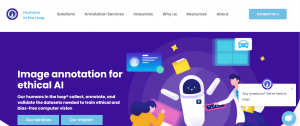
Award-winning social firm Humans in the Loop, located in Bulgaria, offers model training and validation services for machine learning that are moral and devoid of prejudice. Being one of the few EU-based data labeling firms, we place a strong emphasis on continual model refinement through human feedback. We are also GDPR-compliant and a fantastic near-sourcing option for European AI companies. We offer dataset collecting, output verification, 2D and 3D picture and video annotation, error analysis, and dataset services.
Our goal is to link groups impacted by violence, including refugees, to online employment. To have a long-lasting effect on their ability to support themselves, we provide them employment possibilities, training, and upskilling. We now collaborate with a number of groups in Turkey, Syria, and Iraq to assist locals, internally displaced persons, and asylum seekers.
#2. DignifAI
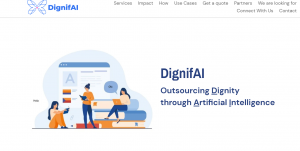 Colombia-based DignifAI is an AI data labeling services firm with a focus on social impact. The recruitment, training, and distribution of AI annotation duties to the migrant population and their vulnerable host communities is the operational foundation of DignifAI. They specialize in computer vision dataset curation and annotation as well as Spanish language NLP tagging.
Colombia-based DignifAI is an AI data labeling services firm with a focus on social impact. The recruitment, training, and distribution of AI annotation duties to the migrant population and their vulnerable host communities is the operational foundation of DignifAI. They specialize in computer vision dataset curation and annotation as well as Spanish language NLP tagging.
In order to address the Venezuelan refugee problem, DignifAI collaborates with Venezuelan refugees in the border city of Cucuta. The initiative started in 2017 with a successful pilot in a Greek refugee camp, then in 2019 they tested the solution with a group of immigrant and refugee women in Boa Vista, Brazil.
#3. Isahit
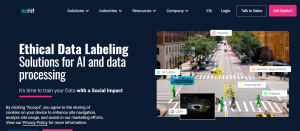
Isahit is a socially responsible outsourcing platform with headquarters in France that enables businesses to source digital activities like data labeling and artificial intelligence. The platform breaks down projects into smaller jobs and provides a secure API in addition to integrated quality control tools. They provide data annotation for both NLP and computer vision, as well as in French and other languages.
More than 1000 HITers, all female employees of the organization, are spread over 32 countries, mostly in Africa, Latin America, and Asia. For a limit of 100 hours per month, they all work on the platform to pay for their further education or to augment their income.
#4. Daivergent
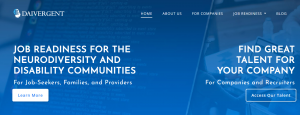
Data services like labeling and annotation are the main areas of concentration for Daivergent, a Public Benefit Corporation with headquarters in the US. They have US-based employees, and their services include end-to-end project management, which is a significant advantage.
The highly concentrated, intricate, repetitive procedures necessary for data classification and the distinctive abilities of persons on the autistic spectrum are the ideal match, according to Daivergent. In order to connect its employees with educational and employment prospects, the firm works with community, governmental, and educational partners.
#5. Sama
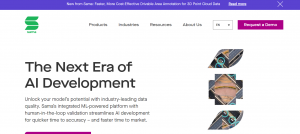
Sama (formerly Samasource) is a B-corporation that was established in Kenya in 2008 by the late businesswoman Leila Janah. They initially operated as a BPO for data input, but they have been engaged in a number of labeling projects for computer vision since 2012. They provide further features including data selection and filtering, model improvement, and thorough reporting through their SamaHub annotation platform.
Sama is a supporter of the “Give work” concept and a member of the Global Impact Sourcing Coalition’s Steering Committee. Insecure populations in Kenya, Uganda, India, Haiti, Pakistan, Ghana, and South Africa have received respectable work thanks to them.
#6. AcmeAI
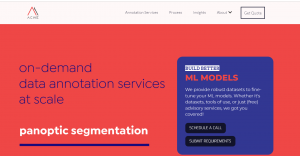
The image labeling division of Bangladesh-based ACME Technologies Ltd. is called AcmeAI. They are a supplier of on-demand picture annotation services that aid in the development of AI systems with an emphasis on labeling tasks based on computer vision. They employ advanced project management approaches and are competent to handle sensitive data in safe conditions.
The company’s recruiting and training of underprivileged children, college dropouts, members of underrepresented groups, and orphans has a positive social impact. In order to include people with impairments in their employment, AcmeAI frequently hosts labeling workshops and collaborates with nearby rehabilitation facilities.
#7. IMerit
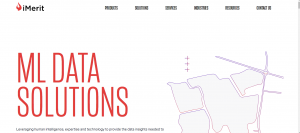
Imerit is an Indian corporation that offers technological services. They are now collaborating with annotators stationed in Bhutan, Bhutan, and Europe. In a variety of industries, including Medical AI, AgriTech, Aerial imaging, and others, they provide data labeling enrichment and annotation services in computer vision and natural language processing.
Their desire to create an inclusive workforce where they can assist in teaching people the skills they need to launch their careers and serve as role models in their communities is part of their commitment to making a positive effect. iMerit mostly employs women and young people from rural East India.
#8. Taqadam
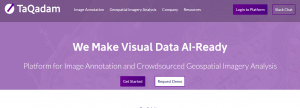
The US-based startup Taqadam provides a platform for geospatial imagery analysis and picture annotation. They provide a complete platform, complete with active learning tools and an API, to handle training data for computer vision models. They also provide analysis of drone and satellite imagery for monitoring and asset performance management.
Their name means “progress” in Arabic, and they presently work with impoverished youngsters recruited through collaborations with NGOs to have a social effect in Lebanon and Iraq. Their employees are able to access mobile wallet payments and e-learning trainings using a custom mobile app that Taqadam provides.
#9. Digital Divide Data

One of the innovators in the impact sourcing sector is Digital Divide Data, which was established in 2001. Since their establishment in Cambodia, they have expanded to provide training for veterans and military spouses in Laos, Kenya, and the US. Content structure, transcription, OCR, and the creation of high-quality datasets for ML are some of their major areas of expertise.
Their mission is to have a positive social effect in Cambodia by providing jobs at a livable wage and computer training to those with few job opportunities. Additionally, Digital Divide Data is a data labeling platform that adheres to the GISC’s Impact Sourcing Standard and is one of the top impact sourcing businesses in Asia.
#10. CloudFactory
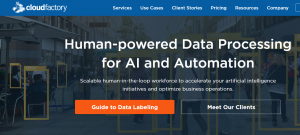
The UK-based startup CloudFactory provides scalable human-powered data labeling for AI, automation, and business operations optimization. It also has offices in the US, Nepal, and Kenya. Through its unique workforce management technology, their expertly managed and trained teams operate with great precision utilizing practically any labeling equipment.
The goal of CloudFactory is to give one million individuals in developing nations access to jobs in the digital age and develop them into community leaders who can fight poverty there. They use a mix of capacity growth and character development to help each cloud worker become a leader in their community. They may earn, study, and serve their way to become leaders worth following through their job in data processing.
#11. Labelbox
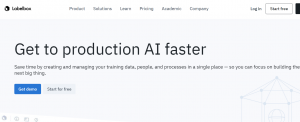
It is a San Francisco-based company that was founded in 2018 by Dan Rasmuson, Brian Rieger, and Manu Sharma. By automating the data labeling process and building active learning models, LabelBox manages and labels the data of its clients. Users of their platform may import and export a variety of various annotation file types, invite team members, and collaborate on processes.
#12. V7Darwin
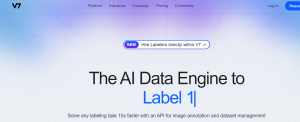
August 2018 saw the founding of this London-based business by Alberto Rizzoli and Simon Edwardsson. They have particular expertise in the agri-tech, manufacturing, autonomous driving, healthcare, and life sciences industries. With little assistance from humans, its V7 Darwin platform generates training data for computer vision projects and enables continuous learning from training data for vision AI. V7 is a pixel-perfect, class-neutral automated annotation tool that is best suited for teams with a lot of data, stringent quality standards, and limited time.
#13. ScaleAI

Alexander Wang, then a 19-year-old MIT student, and Lucy Guo started Scale AI together in 2016. Since then, the business has expanded to include some 300 workers, secured hundreds of millions of dollars in funding, and been valued at more than $3.5 billion. Scale has expanded from its initial emphasis of giving self-driving car businesses picture and video data to become one of the largest in the industry. The firm today provides a wide range of support to companies in a variety of sectors, including government, logistics, and finance.
#14. Amazon SageMaker Ground Truth
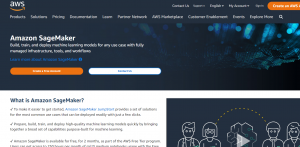
It offers resources for rapidly and correctly developing, training, and deploying machine learning models for use in predictive analytics applications. Public and private human labelers may easily utilize SageMaker Ground Truth, which gives them pre-built processes and user interfaces for typical labeling activities.
#15. Clarifai
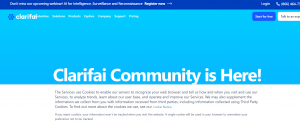
Clarifai is an industry-leading deep learning AI platform for computer vision, natural language processing, and automatic voice recognition. Founded in 2013 by Matthew Zeiler and has its corporate headquarters in Wilmington, Delaware. Their method makes use of convolutional neural networks, which let a computer learn from data labeling examples and make its own inferences, allowing apps to anticipate the right tags for pictures or videos. It features pre-built recognition models that are able to recognize a particular group of pre-specified ideas.
Conclusion
AI is transforming how we conduct business, and your company should jump on board as quickly as feasible. A wide range of industries, including agriculture, health, sports, and more, are becoming smarter because to AI’s limitless potential. The first stage towards innovation is data annotation.
Knowing what data labeling is, how it functions, its best practices, and what to look for when selecting a data labeling platform will allow you to make well-informed decisions for your company and advance operations.

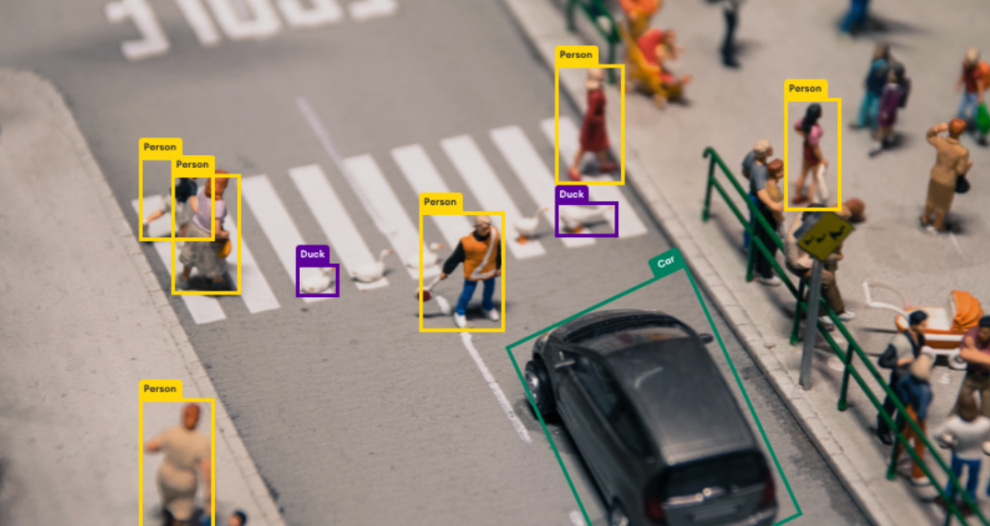








Add Comment